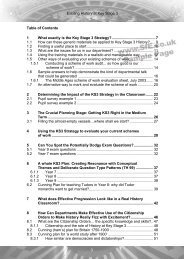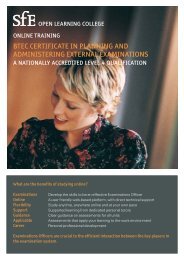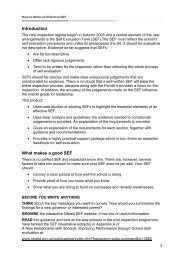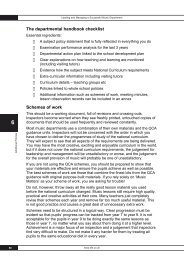Experiential RE supdocs.indd - SfE
Experiential RE supdocs.indd - SfE
Experiential RE supdocs.indd - SfE
You also want an ePaper? Increase the reach of your titles
YUMPU automatically turns print PDFs into web optimized ePapers that Google loves.
4. As the first circle, the topic, is explored pupils are reminded of the response levels:<br />
One – a single word answer<br />
Two – a sentence<br />
Three – the preferred response, a sentence with key words<br />
Four – the most desirable response, sentences with keywords, links with history Biblical<br />
quotations and or examples to illustrate the point being made.<br />
Activity Two: Learning to use arguments for and against<br />
1. Pupils have a list of points for and against arguments for the verification of religious<br />
experience on a sheet of A4. The text is demanding.<br />
2. In pairs or groups they discuss these, underlining each one in red (stop) if it is against and<br />
green (go) if it is in favour.<br />
Activity Three: Learning to write conclusions<br />
Spoken literacy. Here the pupils practise expressing themselves. They need to be able to speak<br />
the ideas before they can write them. The class discuss how to express a conclusion.<br />
Plenary<br />
The learning is summed up and reinforced through a traffic lights discussion (as opposed to the<br />
true/false factual check seen at the beginning of the first lesson)<br />
1. Pupils have three cards: red for ”I don’t agree”; green for “I do agree” and amber for “I am<br />
not sure”.<br />
2. They vote in response to a series of statements.<br />
3. There is no right or wrong answer but this facilitates real thinking and reflection before the<br />
vote and an inclusive and full discussion, deepening the learning after the vote.<br />
Traffic lights discussion questions and statements<br />
• If religious experience is ineffable then it cannot act as proof of God<br />
• Arguments for the existence of God work (to convince people of the existence of God)<br />
• Every person agrees that if there is a God that he is omnipotent; omniscient and<br />
benevolent<br />
• Religious upbringing leads people to believe in God<br />
• Parents should not make their children go to church<br />
Theatre of Learning techniques have made <strong>RE</strong> make sense. Pupils have used multi-sensory,<br />
active and experiential techniques which have motivated and engaged them in their learning,<br />
raised their academic achievement and helped to promote their own spirituality and ability to<br />
empathise with people whose experience is very different from their own.<br />
<strong>Experiential</strong> <strong>RE</strong>: Supporting documents<br />
17








